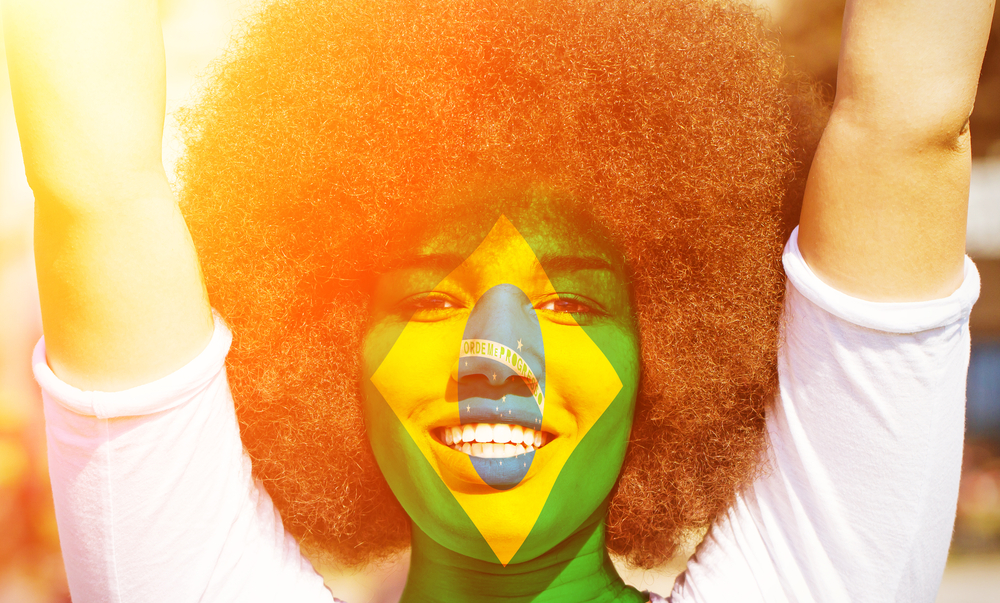While sharing my experiences from Brazil and the stories of the Afro Brazilians that I’m in community with, I have tried my best to express one fundamental truth- the Black populations in the United States and Brazil are uniquely connected- in our pasts and most importantly, our collective futures.
It is time for the next and most important step in my work- finding resources to amplify the direct voices of Afro-Brazilians. I’ve shared the work of the Mochileros Arquivistas (Backpack Archivists), a program to train Brazilians representing marginalized and endangered groups in developing archival institutions to preserve and promote the communities important to them.
This December, a group of those archivists who have been selected to participate in the Lélia Gonzalez Fellowship, will travel to the United States to travel and speak with Black community groups about the realities of Brazil.
Who is Lélia?
Lélia Gonzalez was a philosopher, anthropologist, teacher, writer, intellectual, Black activist and feminist. She was born on February 1, 1935, in the city of Belo Horizonte, Minas Gerais. Gonzalez was the daughter of a maid of indigenous origin and a Black man who was a railway worker.
Belonging to an extensive working family, Lélia migrated from Belo Horizonte to Rio de Janeiro in 1942, where she graduated in history and philosophy, becoming a teacher in the public school system. She went on to earn a master’s degree in social communication and a doctorate in anthropology, becoming a professor and researcher.
Her work focused on the idea of “Black protagonism”, particularly for Black women in post-colonial societies. She fought vigilantly against racism and sexism. Her ideas on Black power and feminism in Brazil have influenced multiple generations of scholars and activists.
Most importantly, she sparked the formation of several important organizations in the Brazilian Black Movement, including the Research Institute of Black Cultures, the Unified Black Movement (MNU), at the national level and the Nzinga Collective of Black Women, Olodum, among others.
But like many Black women leaders throughout history, Lélia’s legacy is tragically overshadowed.
Why did I name the fellowship after her?
I named this fellowship after her because I believe that our futures as Blacks in North and South America are linked. Lélia believed in the intersectionality of the struggles of black populations at the national and transnational levels.
Her work explored the historical, cultural and resistance unity that exists between women and men in Latin America, North America, the Caribbean and Atlantic Africa.
Angela Davis, who is a very popular reference in Brazil for Black Women’s political movements, lectures multiple times a year at universities and community organizations nationwide.
Frequently, Davis remarks to the public about the importance of knowing the work of Gonzalez:
“I feel like I’m being chosen to represent black feminism. But why here in Brazil do you need to look for this reference in the United States? I think I learned more from Lélia Gonzalez than you will learn from me.”
She and Gonzalez met once in 1994 at a conference in Baltimore, one of the few times Afro-Brazilian activists traveled to the United States during that period.
We use this photo from her personal archives as an important symbol of the importance of Black unity.

The Lélia Gonzalez Fellowship brings a diverse group of artists, scholars, and activists to the US to engage in dialogue with communities around the country.
The topics and activists are co-created between the host groups and Atlantic Archives and will cover important subjects like Black spirituality, women’s health, mutual aid, political action, education, family, LGBTQ, media activism, etc..)
Our primary goal is to begin building an international network of intersectional, community-oriented and working class-oriented movements. This first step, through the Gonzalez Fellowship, allows communities across the United States to learn about the reality of Black Brazilians from their own voices.
The tour will include an exhibition of art and lectures from the Atlantic Archives. We will also be documenting the fellowship trip and producing a film and textbook to share our lessons with others.
How can you get involved?
If you represent a group or organization that believes in Black diasporic principles and wants to support this international dialogue, you can email me directly at Smiles4@tulane.edu for a sponsor information pack and application.
We are looking for hosts and supporters in the forms of:
- Fraternities/sororities,
- Grassroots community organizations
- Arts organizations, museums, etc.
- University Departments (LATAM, History, Africana Studies, Internat. Studies, etc.)
- HBCUs
- Spiritual/Religious orgs
- Heritage organizations
- Grade Schools/ Charter Schools
- Women’s Health organizations
- LGBTQ organizations
The deadline for sponsors is October 1st, 2022. I will be sharing more information about the program and the Fellows and staff over the next month.
If you have questions or would like to propose an event with your group, contact me directly at smiles4@tulane.edu.








